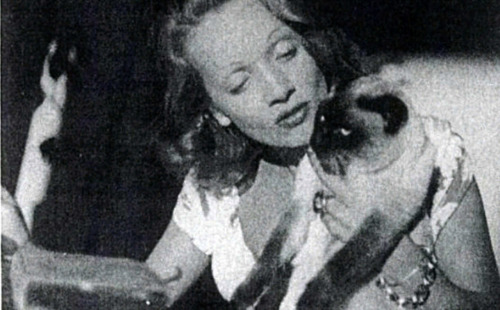 |
| Marlene Dietrich with Dorothy Arzner's pussycat. Appropriate for this post, no? |
Aside from its focus on Marlene's gay appeal, the podcast provides an extensive overview of her life and career that will be of general interest to those unfamiliar with Dietrich or those looking to brush up on their knowledge of her. Whoever researched the biographical content did an admirably thorough job by including quotes from the likes of Maria Riva, Steven Bach, Noel Coward, and Marlene herself. Much to my delight, Miss Dietrich is voiced by a man--David Benson. There are also sound bites of Dietrich's songs that give this podcast buoyancy and clever transitions--such as the last strains of "Black Market"'s strings that segue into Clayton Littlewood's narration about Marlene's early career as a violinist. I only caught one historical inaccuracy--that the Hayes Codes was introduced in 1934. In fact, it was introduced in 1930 but wasn't effectively enforced until 1934. The Hays Office did, however, influence the the script revisions of Blonde Venus in 1932.
Despite the accurate disclaimer that Marlene hated to be identified with her movie roles, Littlewood daringly draws parallels between Dietrich's life and her characters. I find the globe-trotting link between Dietrich and Diane LaVolta compelling enough but consider the connections between Marlene and Amy Jolly a bit of a stretch. Can we really call Amy Jolly bisexual because she kisses a woman and a Francophile because she sings a French song? I regard the Morocco kiss more as a sort of prototype for Katy Perry's "I Kissed a Girl"--lezploitation that chiefly titillates heterosexual men.
The two commentators who dominate this podcast, Terry Sanderson and Simon Watney, are obviously knowledgeable Dietrich fans, and their personal anecdotes interest me the most. Sanderson recalls going with a gay group to see Marlene perform at Wimbledon, where Dietrich slyly acknowledged them by saying, "Try to be gay tonight because it's often difficult to feel gay in the morning." I'm curious to know how Dietrich concerts served as a space for gay people and hope that you'll share your memories and/or observations. Please share any other stories that come to mind, too--as Paul has after hearing Watney's anecdote. When Watney conducted an interview with Marlene, she coveted a photo that he had intended for her to autograph, which reminds me of stories about Dietrich switching photos that fans had sent her to be autographed when she was in retirement on Avenue Montaigne.
As a testimony of Dietrich's status as a gay icon, this podcast most convincingly represents the segment of Marlene's gay following who were able to see her perform onstage during her concert years. Nevertheless, I'm left wanting to know more about the gay fans who may have followed Marlene when her collaborations with Josef von Sternberg first played on the silver screen and am excluded as a gay fan who was born many years after Marlene retired from making public appearances.
Addressing time as a factor in how gay audiences receive Dietrich, Mouse Gilmore Kerr makes this comment: "There was this obviously powerful woman, looking absolutely gorgeous dressed in men's clothes, and I just thought, 'Well, that's what I want to do. Maybe we can all do it. She was doing this such a long time ago.'" Perhaps gay audiences of 1930 also felt empowered when they watched Dietrich's famous Morocco scene kiss, but this feeling would have been different because they were watching that scene when it was still current. Early in the podcast, Wolfgang Theis asserts that Dietrich's films with von Sternberg are common knowledge among gay men, and I must beg to differ. I've been disappointed to meet lots of gay men my age and younger who know nothing about them!
Due to the generational differences within Marlene's fanbase, we have experienced Dietrich in many different ways--whether we're LGBT or some other letter of the alphabet. You may have acquired photos through a press agency that some 16-year-old is now stumbling upon on Tumblr, and you may have attended concerts that the same 16-year-old is now playing on YouTube. Is that teenager's experience a digital echo of yours? I'd say no and that it's a different experience altogether.
Surmising the difference in Marlene's appeal between gay men and lesbians, Terry Castle characterizes the lesbian appeal as more complex. Again, I'd say it's different, and even though Sanderson and Watney's comments reflect a camp sensibility, I would not reduce the interest that they express to a mere taste for camp. At the beginning of this podcast, we hear Sanderson acknowledging the complex messages of Morocco's kiss scene, looking far beyond its camp value. Of course, I could be quite biased. Please share your thoughts by commenting.

A very stunning and sexual woman, she was !
ReplyDelete